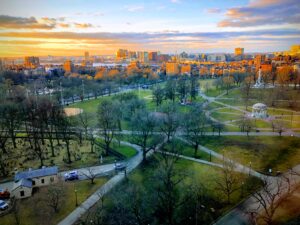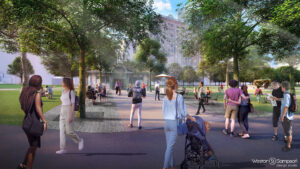By David Wilkening
Contributing Writer

Photo/Courtesy of Weston and Simpson Design Studio
BOSTON – The “People’s Park,” as Boston Common has been dubbed, has certainly aged enough for a facelift these days but one of the improvements is definitely based on popular demand.
“One of our comments heard most often for improvements was more restrooms across the site,” said Cheri Ruane, principal-in-charge at the Boston-based design firm Weston and Sampson, which is overseeing the renovation. “So we’re adding them, and making sure there is access, and that they’re easy to use.”
The 50-plus-acre Boston Common, founded in 1634, is the oldest public park in America. It recently released a master plan for the next decade. The plan calls for upgrades, changes and, hopefully, many improvements that will make it easier to use for the various age groups of visitors and residents who make the park among the most popular places to visit in the city.
Public input into the plan
Roughly 10,000 people shared their hopes and priorities for the park at a series of public meetings, as well as surveys and other events. “We listened to the people,” said Liz Vizza, president of the Friends of the Public Garden, the nonprofit that worked with the Boston Parks and Recreation Department to create the Common Master Plan. Many of the proposed changes were included in the plan, she said.
“This really is a park for the entire city, not just a neighborhood park,” Vizza told The Boston Globe. “Which is why we need it to be the best version, the most resilient version, of itself in order for it to play this role into the future, and be the highest quality it can be.”
A specific timetable was not set but Vizza said the completion of projects will start with improving accessibility. The lack of restrooms may seem mundane but it was among the top complaints. Public restrooms in the past have been provided in the summer time regularly by the Friends.
A long history
Many visitors know the Common name came from its original use: “common land” for the grazing of livestock. But its long history goes far beyond that. It served as a site for Puritanical punishments way back in its early days. It was a camp during the British occupation in 1775. In the 1860s, the Common was used for Civil War recruitment and hosted anti-slavery meetings.
From Colonial times to the present day, the Common has been at the center stage of American history. It has witnessed executions, sermons, protests, and celebrations. It has hosted famous visitors from Generals Washington and Lafayette to Reverend Martin Luther King Jr. and Pope John Paul II. In Colonial times, it served as a meeting place, pasture, and military training field. Bostonians in the nineteenth century added tree-lined malls and paths and following the Civil War, monuments, and fountains. The twentieth century saw victory gardens, troop entertainment, rallies for civil rights and against the Vietnam War, and the first papal mass in North America.
Frederick Law Olmsted never touched Boston Common, but his sons did. About 1913, their firm supervised the paving of walkways, the replenishment of the soil, and the moving of 15-ton trees.
From a utilitarian common ground for activities like grazing, militia formations and public hangings, the Common evolved. Cows were banned in 1830 as the Common gravitated away from agrarian to more recreational and cultural uses. Today, the Common is the scene of a wide variety of activities, ranging from government protests to athletic events.
A variety of amenities

Photo/Courtesy of Weston and Simpson Design Studio
In a statement, Mayor Michelle Wu celebrated the proposed improvement, which she said, “honors the Common’s history, reflects the community’s vision, and creates a space that will be more accessible, more resilient, and more inclusive for generations to come.”
The proposal comes three years after former mayor Martin J. Walsh announced the city would take a fresh look at how to improve the Common after dedicating $28 million to the park from the sale of a city-owned downtown parking garage.
Some of the changes will be geared towards children. For example, the popular playground that draws youngsters of all ages, will be tripled in size. A revamp of the equally popular Frog Pond would include multiple fountains, while a soccer pitch would be added to the athletic fields.
The series of new restrooms will be located throughout the park, including near the athletic complex, inside an expanded Visitor Information Center, at Frog Pond, and by a new public plaza.
New initiatives
While added restrooms will certainly be particularly attractive to older visitors, there are also new initiatives that will be to their tastes.
Two other more dramatic changes for older citizens will certainly be adding benches to sit and take a breather, and improved signage that will make for easier and more efficient walks.
An emphasis on improved navigation would also help direct visitors, and a “Landmark Loop”―an oval-shaped network of pathways modeled after the Freedom Trail that lead to major destinations in the park―would be established through maps, signage, and sidewalk markers.
Many visitors may also find to their taste the addition of a venue serving beer and wine. And dog-owners of all ages will certainly appreciate a new 15,000-square-foot enclosed space to make their lives easier. Once the dog park is operational, the city would phase out the current practice of letting people’s pets roam off-leash elsewhere on the Common.
The Common would also see a number of long-sought improvements for visitors with disabilities, including a wheelchair ramp located by the Robert Gould Shaw and the 54th Regiment Memorial on Beacon Street. Another ramp would lead up to the platform on the Parkman Bandstand.
While the highly researched proposal is extensive, the new additions are hardly set in stone. Vizza said it may be tweaked over the next decade to meet the city’s needs.
So if you have other suggestions, there’s still a chance for you to make the park a better place.
RELATED CONTENT:
Irish Heritage Trail pays tribute to Boston’s largest ethnic group (fiftyplusadvocate.com)
Forest Hills Cemetery a fascinating destination for history, landscape, art (fiftyplusadvocate.com)
Discover World’s End Discover World’s End in Hingham (fiftyplusadvocate.com)












